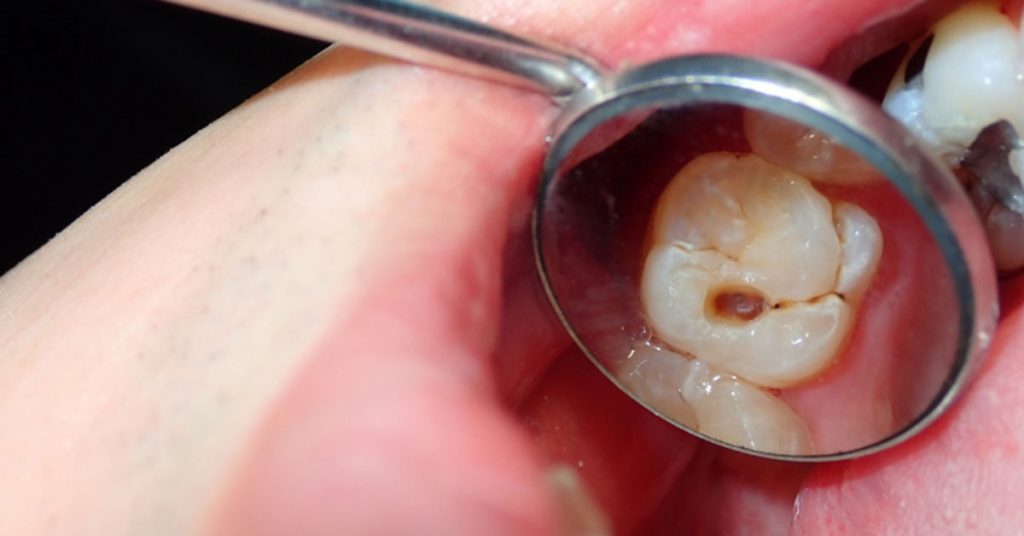Imagine waking up with a parched mouth, as if the Sahara Desert took up residence overnight. A dry mouth, also known as xerostomia, is a condition where the salivary glands fail to produce enough saliva to keep the mouth moist.
While it may seem like a minor inconvenience, dry mouth can have significant consequences for oral health. In this article, we explore the relationship between dry mouth and cavities and shed light on the impact of inadequate saliva production on dental health
The Importance of Saliva
Before delving into the connection between dry mouth and cavities, it’s essential to understand the role of saliva in maintaining oral health. Saliva is a watery fluid produced by the salivary glands that play a crucial role in oral hygiene. It helps to lubricate the mouth, aiding in speaking, chewing, and swallowing.
Additionally, saliva contains enzymes that initiate the digestion process and neutralize harmful acids. Moreover, it acts as a natural defense mechanism, washing away food particles and bacteria that can contribute to tooth decay.
Understanding Dry Mouth
Dry mouth can occur due to various factors, including medication side effects, certain medical conditions, nerve damage, or lifestyle habits. People with dry mouth often experience symptoms like a persistent dry feeling, cracked lips, bad breath, difficulty swallowing, and a tingling sensation in the mouth.
While occasional dry mouth is not a cause for concern, chronic dry mouth can lead to oral health complications, including an increased risk of cavities.
Dry Mouth and Cavities: The Connection
The question arises: Can dry mouth cause cavities? The answer is a resounding yes. Saliva acts as a natural protector against cavities by washing away bacteria and neutralizing acids that erode tooth enamel. When saliva production is reduced, the mouth becomes more susceptible to tooth decay. Without sufficient saliva, harmful bacteria thrive, forming a biofilm known as dental plaque. This sticky substance adheres to the teeth, providing a breeding ground for acid-producing bacteria.
Moreover, the lack of saliva allows these bacteria to flourish, resulting in a higher concentration of harmful acids in the mouth. These acids gradually erode tooth enamel, the protective outer layer of the teeth. Over time, this erosion leads to the formation of cavities.
Furthermore, dry mouth often leads to an imbalance in the oral micro biome, favoring the growth of harmful bacteria over beneficial ones, exacerbating the risk of cavities.
The Role of Saliva in Preventing Cavities
Saliva plays a crucial role in preventing cavities. It acts as a natural remineralizing, helping to repair the early stages of tooth decay. Saliva contains minerals such as calcium and phosphate, which can reverse the demineralization process caused by acid attacks.
Additionally, saliva assists in buffering the pH levels in the mouth, keeping it in a neutral or slightly alkaline range. This inhibits the growth of acid-producing bacteria and prevents enamel erosion.
Furthermore, saliva helps to wash away food particles and plaque, reducing the buildup of harmful bacteria. It also contains antibodies and proteins that provide an additional layer of defense against oral pathogens. Without sufficient saliva, these protective mechanisms are compromised, increasing the likelihood of cavities and other dental problems.
Preventing Cavities in Dry Mouth
While dry mouth can pose challenges to oral health, there are preventive measures that individuals with this condition can take to reduce the risk of cavities. Here are some practical tips:
- Stay Well-Hydrated Maintaining proper hydration throughout the day is crucial for combating the discomfort of a dry mouth. It is recommended to consume an ample amount of water, prioritizing it over sugary beverages that can contribute to tooth decay.
- Opt for Saliva Substitutes When dealing with dry mouth, utilizing readily available saliva substitutes or artificial saliva products can offer temporary relief. These products work by moisturizing the mouth and alleviating dryness.
- Embrace Effective Oral Hygiene Practices Establishing and adhering to a consistent oral hygiene routine is of utmost importance, especially for individuals experiencing dry mouth. Brushing your teeth at least twice a day using fluoride toothpaste and a soft-bristled toothbrush is essential. Additionally, incorporating daily flossing into your routine helps eliminate plaque buildup between the teeth.
- Steer Clear of Tobacco and Alcohol It is highly advisable to abstain from smoking and limit the consumption of alcohol, as these substances can exacerbate dry mouth symptoms and heighten the risk of developing cavities. Taking steps to quit smoking and moderating alcohol intake can greatly benefit oral health.
- Regularly Schedule Dental Check-ups Frequent visits to the dentist are crucial for everyone, particularly for individuals with dry mouth. Dental professionals possess the expertise to detect early signs of tooth decay and provide essential services such as professional cleanings and targeted treatments that help prevent cavities.
A dry mouth can indeed cause cavities, as the lack of sufficient saliva impairs the natural defense mechanisms against tooth decay. Without an adequate amount of saliva, the mouth becomes a favorable environment for harmful bacteria, leading to plaque formation, enamel erosion, and ultimately cavities. It is important to address the underlying causes of dry mouth, such as medication side effects or medical conditions, to manage the symptoms effectively.
By understanding the connection between dry mouth and cavities and taking proactive measures, such as staying hydrated, practicing good oral hygiene, and seeking regular dental care, you can mitigate the risks associated with dry mouth and maintain optimal oral health.
Lubricity is a Proud Supporter of the
What do customers say about Lubricity Dry Mouth Spray?













